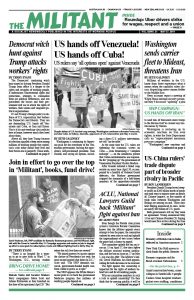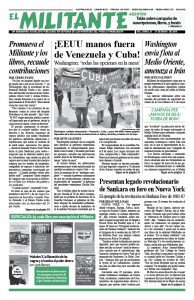President Donald Trump levied steeper tariffs on $200 billion worth of goods and took steps to impose taxes on nearly all Chinese imports, as five months of trade talks between Washington and Beijing are nearing an end. Three days later Beijing announced its own levies on nearly $60 billion of U.S. goods.
Both governments still say they want an agreement. Trump announced May 13 he and Chinese President Xi Jinping would meet face to face during the June 28-29 G-20 conference in Japan.
The trade tussle between U.S. imperialism and Chinese capitalists — the world’s two largest economies — has rattled Wall Street investors, worried about a drag on growth and profits worldwide.
U.S. imperialism’s place as the mightiest world power is declining, but it still retains global supremacy, conquered in the second interimperialist bloodbath over seven decades ago. Washington is trying to defend its interests against the long-term challenge by Beijing — from trade and technology to military reach. Rivalry between the two powers is a permanent feature of today’s world.
If the dispute isn’t resolved to its liking, the White House has threatened additional duties on most of Beijing’s remaining exports to the U.S., some $300 billion worth. The U.S. rulers have the upper hand for now as their $420 billion trade deficit with China is an advantage in any protracted tariff dispute.
U.S. officials told CNN that Chinese negotiators backtracked on commitments to change Chinese laws to protect foreign investors’ intellectual property and trade secrets, allow more competition with China’s state sector and to stifle their manipulation of China’s currency. Trump said Beijing shouldn’t have tried to “renegotiate deals with the U.S. at the last minute.”
China’s chief trade negotiator, Vice Premier Liu He, said May 10 that agreement could only be reached if the U.S. accepted more realistic targets for Chinese purchases of U.S. goods. He said the text needed to be “balanced” to ensure the “dignity” of both nations.
Many U.S. bosses and bankers back the president’s hardball stance. Trump also has backing from some Democratic Party leaders, like New York Sen. Chuck Schumer, who told him, “Hang tough on China.” And from Richard Trumka, the pro-protectionist president of the AFL-CIO union federation.
Among those hardest hit by the effects of the tariffs are U.S. farmers. Trump says his tough tactics will help them in the long run, and that he will use tariff revenue to boost farm production and income by buying up soybeans and other farm goods and sending them to “starving countries.” But any such subsidies would inevitably end up in the hands of the agribusiness monopolies and big capitalist farmers.
Washington and Beijing are also stepping up competition for naval dominance in the Western Pacific and beyond.
The Chinese military is rapidly modernizing and expanding its navy, closing the gap on Washington’s unchallenged reign over area seaways. The Pentagon is concerned about Beijing’s fortified islets in the South China Sea and the growing number of new anti-ship missiles, including a so-called aircraft carrier killer.
The U.S. rulers are trying to reassert their technological lead in missile defense and other weaponry. They are pressing the imperialist rulers from Japan to Australia and other capitalist powers in the Indo-Pacific region to back them as a counterweight to Beijing.

